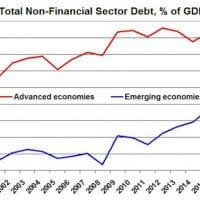-
Sadly, there is no strike wave
In a September 8 post to the Jacobin website, Eric Dirnbach announced that “U.S. workers are striking again.”
-
Gender, Labor, & Law with Emma Caterine
In this episode, we speak with Emma Caterine (@emmacaterineDSA), a law graduate and writer with more than a decade of experience working within economic justice, feminist, LGBTQ, and racial justice movements. We talk Democratic Socialists of America, MMT, the advantages of a federal jobs guarantee over a universal basic income, the place for sex work in a jobs guarantee program.
-
China offers African Nations $60 Billion in development with ‘no strings attached’
In response to accusations of encouraging “debt trap” diplomacy in Africa, Chinese President Xi Jinping said the announced aid package is not “a scheme to form an exclusive club or bloc against others. Rather it is about greater openness, sharing and mutual benefit.”
-
Another day older and deeper in debt…
The question of debt is often absent from media coverage of the progress, or not, of the world economy.
-
Mike Davis on Trumps America
Donald Trump is coming to Ireland. Behind the bluster, what does his presidency actually represent? Mike Davis—a world renowned American scholar, and author of several books—was interviewed by Seán Mitchell for Rebel, about the state of Trump’s America.
-
Sympathy for the devil?
In recent years, as so often in the past, we’ve witnessed those at the top sabotaging the pact (simply because they have the means and interest to do so) and now, once again, they’ve undermined their legitimacy to run things.
-
Economic moats and American capitalism
In a 1999 interview with Fortune, legendary investor Warren Buffett coined the term “economic moats” to sum up the main pillar of his investing strategy.
-
UN scientific paper suggests capitalism has to die in order for the planet to be saved
Capitalism and global sustainability are incongruous with one another, according to a recent paper for the UN’s 2019 Global Sustainable Development Report.
-
Social reproduction: what’s the big idea?
Key to social reproduction theory (SRT) is an understanding of the ‘production of goods and services and the production of life are part of one integrated process’, or in other words: acknowledging that race and gender oppression occur capitalistically.
-
Utopia and materialist critique
The argument I’ve been making during this series on utopia is that the utopian moment of the Marxian alternative to mainstream economics is critique.*
-
There is still time for an ecological revolution to prevent hothouse earth
The only thing that could alter this dire situation, all over the world, is the rise of another power in society. We need not millions but hundreds of millions of people, necessarily predominantly working class, in the street day in and day out.
-
Sanctions, sanctions, sanctions–the final demise of the dollar hegemony?
Sanctions left and sanctions right. Financial mostly, taxes, tariffs, visas, travel bans–confiscation of foreign assets, import and export prohibitions and limitations; and also punishing those who do not respect sanctions dished out by Trump, alias the U.S. of A, against friends of their enemies.
-
Interview with Angel Prado (Part II): “The commune holds the solution to the crisis”
The continuation of a comunero leader’s reflections on the future of the communal project and the contradictions in the Bolivarian Process, in this interview with VA’s Ricardo Vaz.
-
It is imperative to reconstruct the Internationale of workers and peoples
For the last thirty years the world system has undergone an extreme centralization of power in all its dimensions, local and international, economic and military, social and cultural.
-
The 21st Century has been hard on U.S. households
The 21st Century has not been a good one for most working people in the United States. In fact, for most of this century, real median household income has been below its starting value in January 2000.
-
Interview with Angel Prado (Part I): “The commune holds the solution to the crisis”
A grassroots Chavista leader reflects on the future of the communal project and the contradictions in the Bolivarian Process, in this interview with VA’s Ricardo Vaz.
-
What’s Left in Nicaragua after Ortega
Before the violence that started mid-April, Nicaragua had been the most peaceful, safest, and by far the most progressive country in Central America. Now that a semblance of peace has been restored in Nicaragua, the U.S. government continues its campaign for regime change joined by some who formerly supported Nicaraguan President Daniel Ortega and his Sandinista party.
-
Dossier 7: The imperialism of finance capital and ‘trade wars’
Trump wants to resolve the crisis for America, caused by neo-liberalism, within the basic confines of neo-liberalism itself, i.e. without violating its core characteristic, which is free global mobility of finance.
-
The optimism of a victor
Finding a formula to describe Fidel is no easy task.
-
Death of a Marxist
Amin’s thesis—in economics—was written while he was active in the French Communist Party. In the thesis, he thought hard about the problems of his native land and other countries despoiled by the colonial menace. For Amin, as with other dependency theorists, the Third World suffered from theft, plunder as well as deindustrialisation, and then unequal exchange.




















